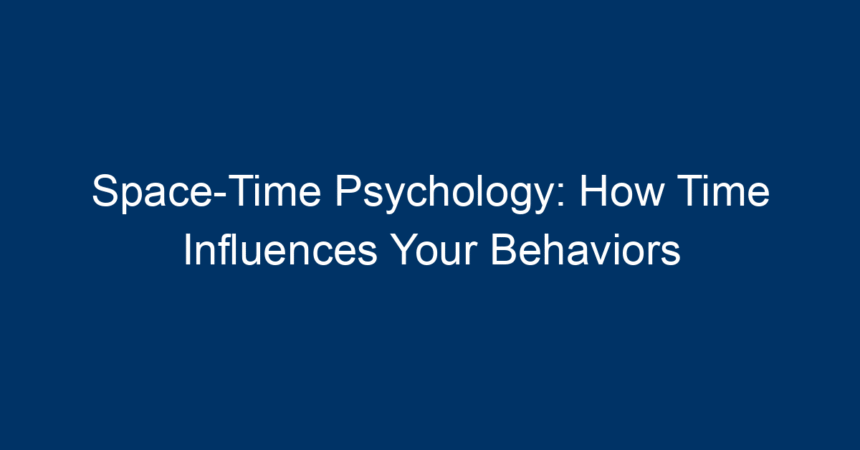Introduction
Have you ever noticed how the passage of time affects your mood, decisions, and behaviors? From feeling rushed during a busy workday to experiencing a sense of nostalgia on a lazy Sunday afternoon, time plays a crucial role in our everyday experiences. Enter space-time psychology, a fascinating field that examines the relationship between time and human behavior. By understanding how time influences our thoughts and actions, we can harness this knowledge to improve our emotional well-being, productivity, and even our relationships. In this article, we’ll explore the intricacies of space-time psychology, helping you to recognize the powerful impact that time has on your life.
Understanding Space-Time Psychology
What is Space-Time Psychology?
Space-time psychology is an interdisciplinary approach that merges principles from psychology, sociology, and even physics. It studies how individuals perceive and respond to time in various contexts, highlighting the dynamic interplay between our psychological states and the temporal aspects of our environment. By exploring this unique relationship, we can gain insights into why we behave the way we do and how to optimize our mental and emotional well-being.
The Historical Context
The roots of space-time psychology can be traced back to the early 20th century when psychologists began to explore the effects of time perception on behavior. Pioneers like William James and Henri Bergson contributed to this discussion, emphasizing that time is not merely a linear progression but rather a subjective experience. This understanding has evolved over time, incorporating modern discoveries in neuroscience and cognitive psychology.
The Importance of Time Perception
Our perception of time can vary greatly depending on a range of factors, including our emotional state, cultural background, and even our physical environment. Time perception influences decision-making, goal-setting, and interpersonal relationships, making it an essential aspect of space-time psychology.
How Time Influences Behavior
1. Time Scarcity and Decision Making
In a world driven by deadlines and expectations, the feeling of time scarcity can lead to rushed decisions and impulse behaviors. Research shows that when we perceive time as limited, we are more likely to make choices based on immediate gratification rather than long-term benefits. This can result in unhealthy habits, such as overeating or shopping impulsively.
Actionable Insight: To combat the negative effects of time scarcity, it’s crucial to prioritize tasks and make a concerted effort to manage your time effectively. Techniques like time-blocking and the Pomodoro technique can help in reducing the urgency that often leads to poor decision-making.
2. The Role of Temporal Context in Emotions
Our emotional states are intricately linked to how we perceive time. When we’re happy or excited, time seems to fly; conversely, during periods of stress or boredom, it appears to drag on. This perceptual distortions can influence how we interact with others, potentially leading to misunderstandings in relationships.
Actionable Insight: Cultivating mindfulness can enhance your emotional intelligence by helping you become more aware of your emotional reactions to time. Practices such as meditation and journaling allow you to recognize these feelings and their impact on your behavior.
3. Cultural Differences in Time Orientation
Various cultures have different orientations towards time, which can influence behaviors and social interactions. For example, Western cultures often prioritize punctuality and future planning, while some Eastern cultures place a higher value on the present moment and relationships. Understanding these differences can enhance cross-cultural communication and reduce misconceptions.
Actionable Insight: When interacting with individuals from different cultural backgrounds, take time to understand their perspective on time. This can improve collaboration and lead to more harmonious relationships in both personal and professional settings.
4. Future Time Perspective and Goal Achievement
A key tenet of space-time psychology is the concept of future time perspective. Individuals who orient themselves towards future goals often experience higher motivation and satisfaction. Conversely, those who dwell on past mistakes may find it harder to move forward.
Actionable Insight: To harness the power of future time perspective, set clear, achievable goals and use visualization techniques to imagine your success. Break these goals down into manageable tasks and celebrate small victories along the way.
The Neuroscience of Time Perception
Brain Mechanisms Involved in Time Perception
Neuroscientific research indicates that different brain areas are responsible for processing time. The prefrontal cortex, basal ganglia, and cerebellum work together to regulate our sense of time, influencing everything from decision-making to emotional regulation. Understanding these mechanisms can offer deeper insights into our behaviors and patterns.
The Impact of Age on Time Perception
As we age, our perception of time can change significantly. Many older adults report that time feels like it passes more quickly compared to when they were younger. This shift can affect how they prioritize their goals and interact with others.
Actionable Insight: Acknowledge these changes in time perception at various life stages. Activities that enhance time awareness, like mindfulness practices or engaging in new experiences, can help people of all ages feel more connected to the present moment.
Practical Applications of Space-Time Psychology
Enhancing Productivity
Utilizing concepts from space-time psychology can enhance productivity in both personal and professional settings. By structuring tasks around our natural rhythms and identifying peak performance times, we can optimize our output and reduce procrastination.
Improving Relationships
Being mindful of how time affects your interactions can lead to healthier relationships. Understanding that different people have varying perceptions of time can help you navigate conflicts and improve communication.
Mental Well-Being
Understanding and applying principles from space-time psychology can significantly enhance your mental well-being. By learning to manage your time perception and focusing on constructive behaviors, you can cultivate a more balanced and fulfilling life.
Conclusion
Space-time psychology offers an invaluable understanding of how time influences our behaviors and mental states. By recognizing the impact of time on decision-making, emotional responses, and our connections with others, we can make deliberate changes that enhance our quality of life. Embrace the principles of space-time psychology to elevate your productivity, foster healthier relationships, and cultivate a more fulfilling emotional existence. Remember: it’s not just about how you spend your time, but how you perceive it that truly shapes your experiences.
Actionable Takeaways
- Practice Time Management: Use techniques like time-blocking to alleviate pressure from deadlines.
- Cultivate Mindfulness: Engage in practices such as meditation to enhance awareness of your emotional state relative to time.
- Understand Cultural Differences: When working with others, take time to learn about their cultural perspectives on time to improve communication.
- Set Future Goals: Continuously visualize your future to maintain motivation and focus on long-term objectives.
By incorporating these insights into your life, you can leverage the concepts of space-time psychology to achieve a more balanced and rewarding existence.




